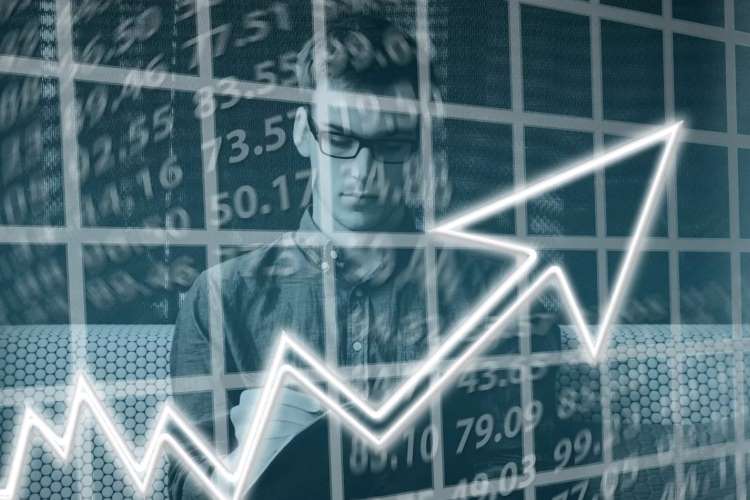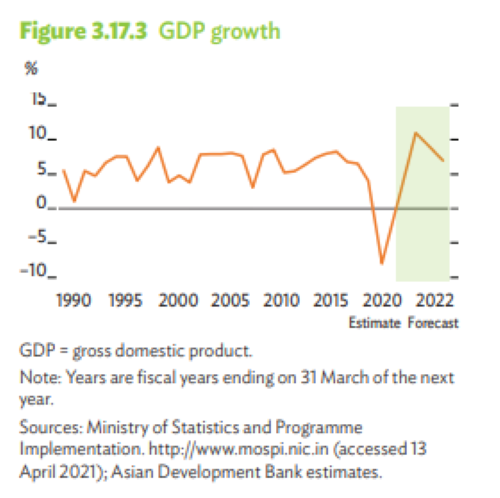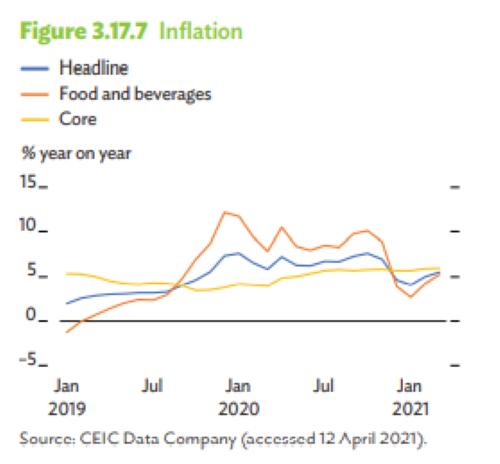
Indian economy will expand 11% in 2021, driven by an increase in capital expenditure and accommodative monetary policy. However, the next calendar year will see a moderate 7% growth, according to the Asian Development Bank. Much of the sharp recovery in the current year is due to the low-base effect because of the 8% contraction in 2020, triggered by the Covid-19 pandemic and the economic crisis that ensued.
The recovery was made possible by the rollout of a number of vaccines, the stimulus packages announced to counter the economic crisis, and an uptick in US demand, says the latest Asian Development Outlook, released by the ADB on Wednesday. The IMF had predicted a 12.5% growth for the Indian economy in financial year 2021-22.
READ I Vibrant civil society key to achieving sustainable development goals

Despite the biggest vaccine rollout, the country saw a record rise in Covid-19 cases since February, presenting a downside risk to the nascent recovery of Indian economy. The robust growth projection by the ADB assumes a smooth rollout of vaccines in the coming months.
READ I Future perfect: Five pivots to governance, corporate culture
Indian economy’s growth prospects and Covid-19
The Narendra Modi government has budgeted Rs 35,000 crore for India’s Covid-19 vaccination programme that was launched on January 16. It plans to vaccinate 30 crore citizens by August 2021, but the vaccination programme is hit by delays and hesitancy. By mid-April, the country has administered more than 12 crore doses to more than 10 crore people. At the current pace, the country can achieve herd immunity by the end of the current financial year.
Public investment will rise on the back of the Modi government’s infrastructure push. The Union Budget 2022 has earmarked 2.5% of the GDP for capital expenditure. The prime minister’s office will directly monitor 50 infrastructure projects worth more than Rs 2 lakh crore. The government has also initiated reforms to ensure fund flows to infrastructure projects. Private investment also is expected to pick up due to improved sentiment triggered by accommodative credit conditions.
India’s struggling manufacturing sector will be boosted by the creation of mega textile parks and the revised Production-Linked Incentive Scheme. The purchasing managers’ indices for manufacturing and services have improved consistently for seven consecutive months.
READ I Covid-19 vaccine diplomacy: India’s chance to deepen its strategic engagements
South Asia to see strong recovery
Other South Asian economies will also experience strong growth. Afghanistan, Pakistan, and Nepal will experience robust growth in 2021, backed by the normalisation of economic activity, and buoyant remittances. The pandemic and the resultant economic crisis had hit all South Asian economies except Bangladesh. The pandemic had severely affected economies such as Maldives and Sri Lanka that are dependent on tourism industry. They will register a quick recovery this year.

Inflation may have fallen to 5.2% by the end of the financial year ended March 2021. Inflation may ease further to 4.8% in the current financial year. Food inflation that shot up in India in 2020 due to supply disruptions will fall due to high base effect and forecast of a normal monsoon rain. Inflation trend in India will have an impact on South Asian economy. Developing Asia will witness benign inflation with average headline inflation in the region falling from 2.8% in 2020 to 2.3% in the current year.
The first 11 months of last financial year saw merchandise imports contracting by 18.4% compared with the previous year due to a fall in domestic demand. Low crude oil prices and weak demand saw India’s oil import bill falling by around 30%. Gold imports also contracted by double digits in value terms. The period saw merchandise exports shrinking by 7.6% on poor global demand, but exports of farm products, minerals, and chemicals expanded. India has become a global manufacturing hub for vaccines, and pharmaceuticals was among the country’s top five exports in financial year 2020.
A prolonged second wave of Covid-19 pandemic could impact the recovery of Indian economy, says ADB. The forecast expects muted economic impact of the second wave, compared with the dent made by the first wave. Tightening of global financial conditions also could affect the Indian economy.
